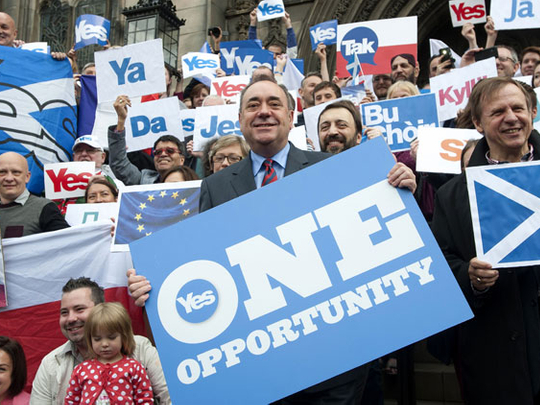
In the centuries before the acts of union, the Scots, alternately bullied and patronised by a succession of English kings, defined their very national identity in terms of freedom from England. The English, as Shakespeare put it in his play about Henry V, affected an eagle’s contempt for “the weasel Scot”. The mutual loathing between the two peoples was as visceral as it was toxic. Yet, barely a century after the accession of the Stuarts to the English throne, the two old enemies did come together. More than that, they made such a success of their union, that an island that even in the 17th century had been ravaged by cross-border invasions would come to serve the world as a byword for stability.
The Scots and the English, it turned out, were not so very different after all. Indeed, their respective traditions and values proved to be gloriously compatible. As a result, like a well-made cocktail, the United Kingdom of Britain ended up being vastly more than the sum of its parts.
Yet, it is not ultimately the manufacture of James Watt’s steam engine in Birmingham, nor Keir Hardie winning a parliamentary seat in West Ham, nor the skirl of bagpipes sounding over Sword Beach in Normandy in 1944, that best sums up what the Scots and English have accomplished as partners. Rather, it is the simple fact that for 300 years now, two such proud and distinctive peoples have been able to co-exist in a political union at all. It is an achievement that many in this shared island of Britain have long taken for granted. Not, however, any longer.
Certainly, that the Scots could even contemplate leaving a country that they have done so much to forge demonstrates with urgent clarity that the status quo is no longer sustainable. This, for many voters in next week’s referendum, is the principal reason they will be voting ‘yes’; and it is hard, watching from south of the Tweed, not to be impressed by the passion and optimism that so many of them have brought to the goal of building a better future.
Yet, one can recognise this and still feel that the re-imposition of a border across Britain, that ultimately goes back to the 11th century and the reign of Cnut, is not necessarily the most progressive of policies. Scotland’s problems, after all, are Britain’s problems too and any vote to sever the bonds that currently link the Scots to their fellow citizens in the UK will serve, in effect, as an abandonment of shared responsibilities that previous generations were proud to shoulder. The better future that the Scots want to build is one that their fellow citizens in England, Wales and Northern Ireland would very much like to share in too.
Ultimately, it is political union that undergirds social union and social union that undergirds the mutual bonds of affection and admiration without which a country is nothing. That the decision on whether to leave the UK is for the Scots alone to make, none of those outside Scotland would deny; and yet it would be remiss for them not to let them know how very much they would miss them were they to go.
That is why I and others who are desperate for the Scots to contribute to fashioning a new and better Britain have posted a letter online, with the aim of expressing as much. Already, luminaries from across the spectrum of British achievement are signatories: From Paul McCartney to David Attenborough; from Judi Dench to Michael Morpurgo; from Stephen Hawking to Bobby Charlton. Everyone in England, Wales and Northern Ireland who agrees with its sentiments is invited to sign it too. Make our voices heard loudly enough, and maybe, just maybe, next week will witness not a divorce but a renewal of vows.
Scotland and England, those twin kingdoms who snarl and snap at each other throughout Munro’s trilogy of history plays, deserve better than to lose their mutual sense of responsibility for each other. Too much has been achieved by it — and may yet be achieved in the future. That is why, when they go to the polls next week, I hope the Scottish people will vote not to reimpose a border where, for more than 300 years now, there has been none.
— Guardian News & Media Ltd
Tom Holland is an author








